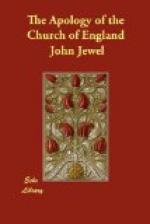But it may chance to this they will say: These things may sometime happen in the best governed commonwealths, yea, and against the magistrates’ wills: and besides, there be good laws made to punish such. I grant it be so: but by what good laws (I would know) have these great mischiefs been punished amongst them? Petrus Aloisius, after he had done that notorious act that I spake of, was always cherished in his father’s bosom, Pope Paul the Third, and made his very derling. Diasius, after he had murdered his own brother, was delivered by the Pope’s means, to the end he might not be punished by good laws. John Casus, the Archbishop of Beneventum, is yet alive, yea, and liveth at Rome, even in the eyes and sight of the most holy father.
They have put to death infinite numbers of our brethren, only because they believed truly and sincerely in Jesu Christ. But of that great and foul number of harlots, fornicators, adulterers, what one have they at any time (I say not killed, but) either excommunicated, or once attached? Why! voluptuousness, adultery, ribaldry, whoredom, murdering of kin, incest, and others more abominable parts, are not these counted sin at Rome? Or, if they be sin, ought “Christ’s vicar, Peter’s successor, the most holy father,” so lightly and slightly to bear them, as though they were no sin, and that in the city of Rome, and in that principal tower of all holiness?
O holy Scribes and Pharisees, which knew not this kind of holiness! what a Catholic faith is this! Peter did not thus teach at Rome: Paul did not so live at Rome: they did not practise brothelry, which these do openly: they made not a yearly revenue and profit of harlots: they suffered no common adulterers and wicked murderers to go unpunished. They did not receive them into their entire familiarity, into their council, into their household, nor yet into the company of Christian men. These men ought not therefore so unreasonably to triumph against our living. It had been more wisdom for them either first to have proved good their own life before the world, or at least to have cloaked it a little more cunningly. For we do use still the old and ancient laws, and (as much as men may do, in the manners used at these days, all things are so wholly corrupt) we diligently and earnestly put in execution the ecclesiastical discipline: we have not common brothel-houses of strumpets, nor yet flocks of concubines, nor herds of harlot-hunters: neither do we prefer adultery before matrimony: neither do we exercise beastly sensuality: neither do we gather ordinary rents and stipends of stews: nor do we suffer to escape unpunished incest and abominable naughtiness, nor yet such manquellers as the Aloisians, Casians, and Diazians were. For if these things would have pleased us, we needed not to have departed from these men’s fellowship, amongst whom such enormities be in their chief pride and price. Neither needed we, for leaving them, to run into the hatred of men,




